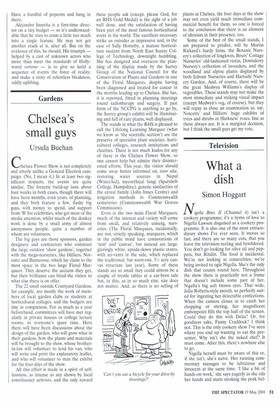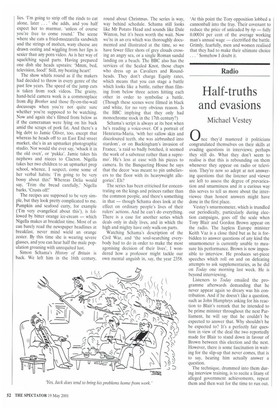Television
What a dish
Simon Hoggart
Nigella Bites II (Channel 4) isn't a cookery programme; it's a hymn of love to Nigella Lawson disguised as a cookery programme. It is also one of the most extraordinary shows I've ever seen. It moves so fast, and there are so many cuts, that you leave the television reeling and bewildered. You don't go looking for olive oil and peppers, but Ritalin. The food is incidental. We're not looking at comestibles; we're being invited to ogle Nigella. She's the only dish that counts round here. Throughout the show there is practically not a frame that doesn't include some part of her. Nigella's big soft brown eyes. That wide. Julia Roberts-style mouth, so perfectly suited for ingesting her delectable confections. When the camera closes in to catch her chopping or stirring, her magnificent embonpoint fills the top half of the screen. Could they do this with Delia? Or, for goodness sake, Fanny Craddock? I think not. This is the only cookery show I've seen where you end up wanting to eat the presenter. Why isn't she the naked chef? It must come. After this, there's nowhere else to go.
Nigella herself must be aware of this or, if she isn't, she's naive, Her running commentary manages to be lubricious and innocent at the same time. 'I like a bit of hands-on work,' she says eagerly as she oils her bands and starts stroking the pork bel lies. 'I'm going to strip off the rinds to eat alone, later . . . ' she adds, and you half expect her to murmur, 'unless of course you're free to come round.' The scene where she eats a fried-mozzarella sandwich and the strings of molten, waxy cheese are drawn oozing and wiggling from her lips is sexier than any porn video. As is her way of squelching squid parts. Having prepared one dish she heads upstairs: `Mmm, bed, television, food!' Still, my beating heart!
The show whirls round as if the makers had decided to throw in every genre of the past few years. The speed of the jump cuts is taken from rock videos. The grainy, hand-held camera work is a commonplace from Big Brother and those fly-on-the-wall docusoaps when you're not quite sure whether you're supposed to be watching. Now and again she's filmed from below as if the cameraman were lying on his back amid the scraps of pork fat. And there's a big debt to Jamie Oliver, too, except that whereas he heads off to an East End street market, she's in an upmarket photographic studio. Nor would she ever say, 'whack it in the old oven', or 'pukka'. Jamie takes his nephews and nieces to Clacton. Nigella takes her two children to an upmarket prep school, whence, I suspect, come some of her verbal habits: 'I'm going to be very bossy about this!' Whereas Delia would say, 'Trim the bread carefully,' Nigella barks, 'Crusts off!'
The recipes are supposed to be very simple, but they look pretty complicated to me. Pumpkin and seafood curry, for example ('I'm very evangelical about this'), is followed by bitter orange ice-cream — which Nigella makes at breakfast time. Most of us can barely read the newspaper headlines at breakfast, never mind wield an orange zester. By this time she is wearing severe glasses, and you can hear half the male population groaning with unrequited lust.
Simon Schama's History of Britain is back. We left him in the 16th century,
round about Christmas. The series is way, way behind schedule. Schama still looks like Mr Potato Head and sounds like Dale Winton, but it's been worth the wait. Now we're in an era which was thoroughly documented and illustrated at the time, so we have fewer filler shots of grey clouds crossing an angry sea, or a single Roman sandal landing on a beach. The BBC also has the services of the Sealed Knot, those chaps who dress up as Cavaliers and Roundheads. They don't charge Equity rates, which means that you can stage a battle which looks like a battle, rather than filming from below three actors hitting each other in order to symbolise a battle. (Though these scenes were filmed in black and white, for no very obvious reason. Is the BBC implying that they only had monochrome stock in the 17th century?) Schama's script is always at its best when he's reading a voice-over. Of a portrait of Henrietta-Maria, 'with her sallow skin and discoloured teeth, she was airbrushed into stardom', or on Buckingham's invasion of France, 'a raid so badly botched, it seemed the work of a saboteur rather than a supremo'. He's less at ease with his pieces to camera. In the Banqueting House he says that the decor 'was meant to pin unbelievers to the floor with its heavyweight allegories'. Eh?
The series has been criticised for concentrating on the kings and princes rather than the common people, and there's something in that — though Schama does look at the effect on ordinary people's lives of their rulers' actions. And he can't do everything. There is a case for another series which deals only in daily lives, and in which the high and mighty have only walk-on parts.
Watching Schama's description of the Civil War, and 'the soul-searching everybody had to do in order to make the most agonising decision of their lives', I wondered how a professor might tackle our own mental anguish in, say, the year 2358. 'At this point the Tory opposition lobbed a cannonball into the fray. Their covenant to reduce the price of unleaded by 6p — fully 0.00034 per cent of the average working man's annual wage — electrified the battle. Grimly, fearfully, men and women realised that they had to make their ultimate choice . ' Somehow I doubt it.



































































 Previous page
Previous page